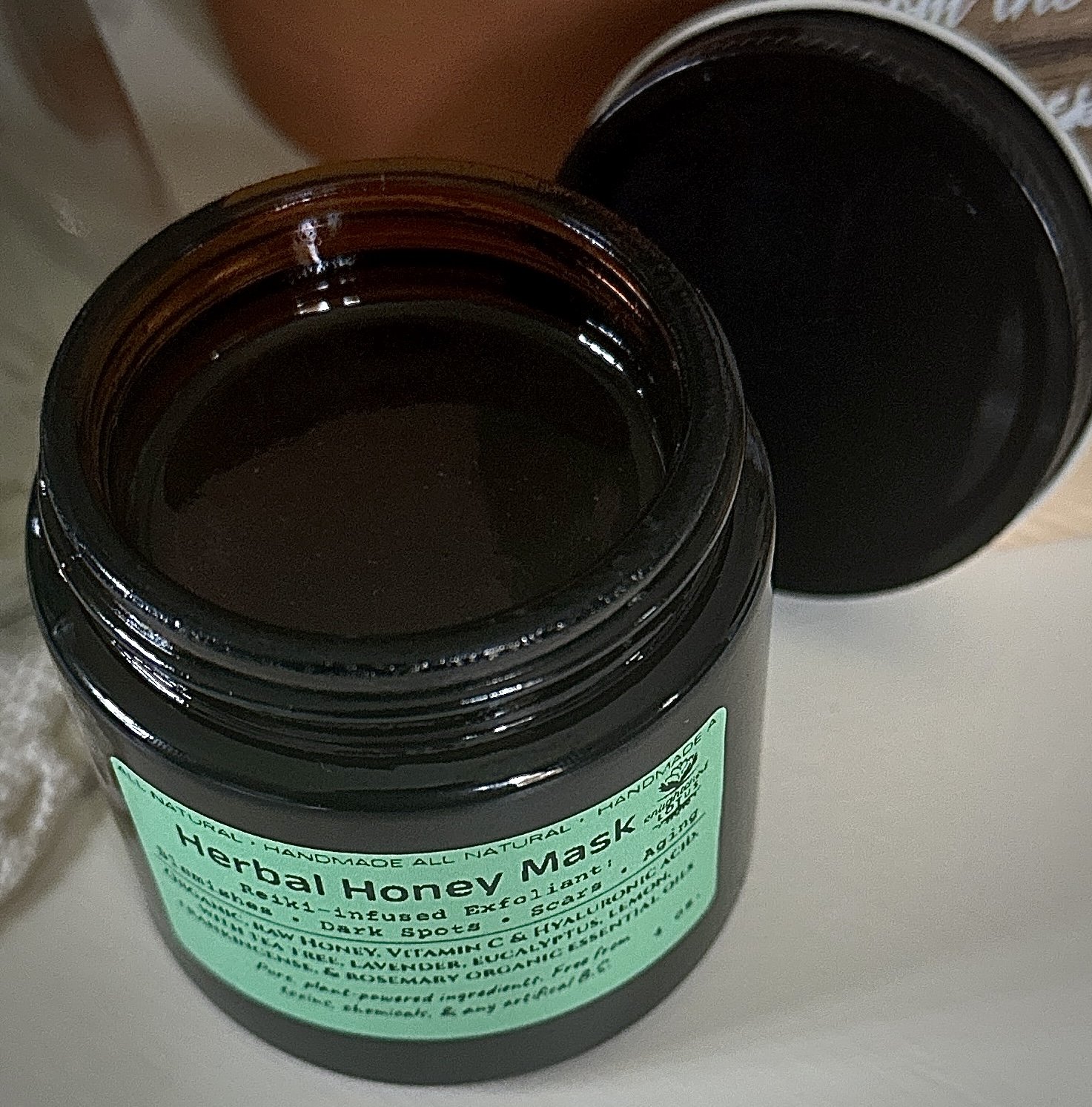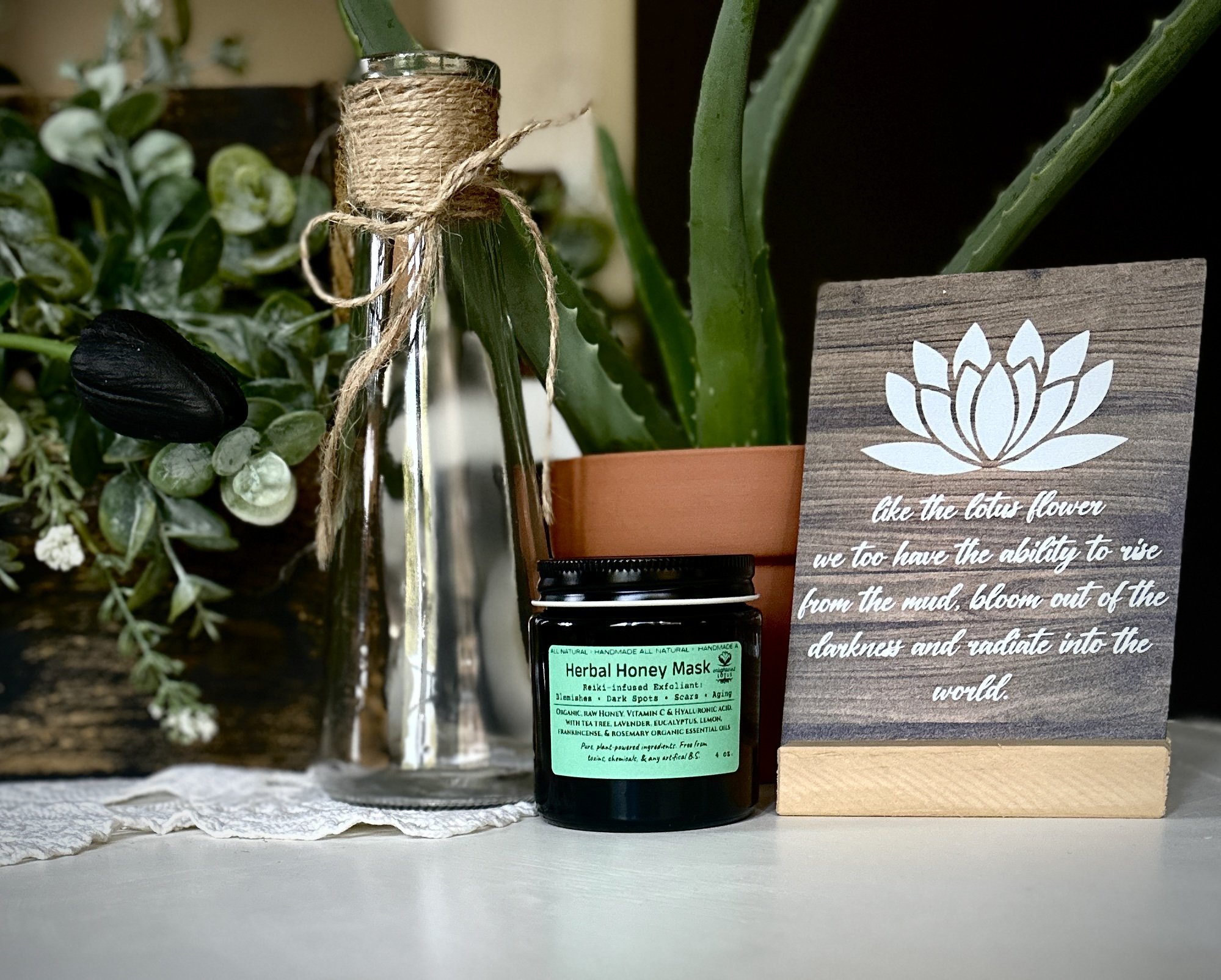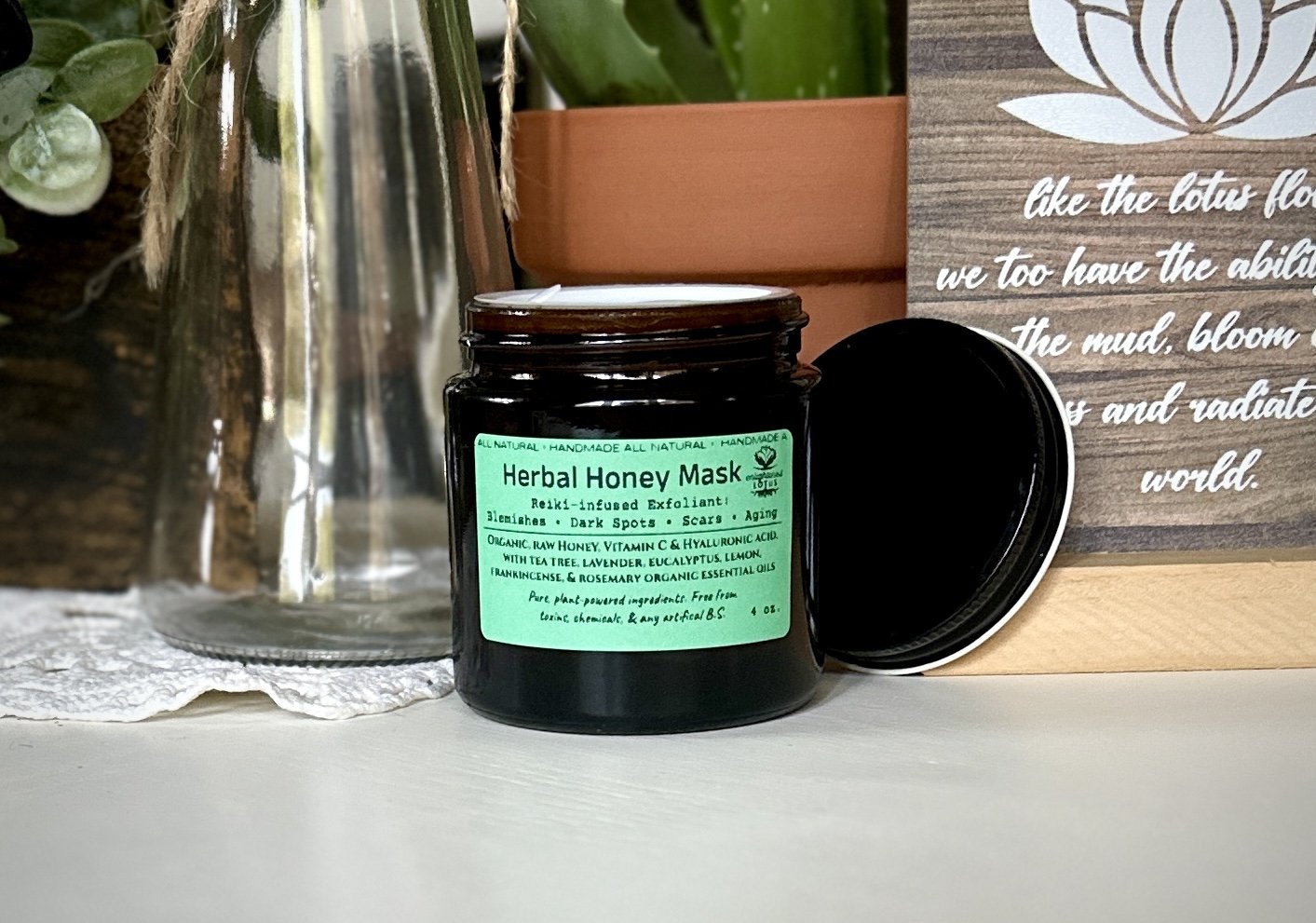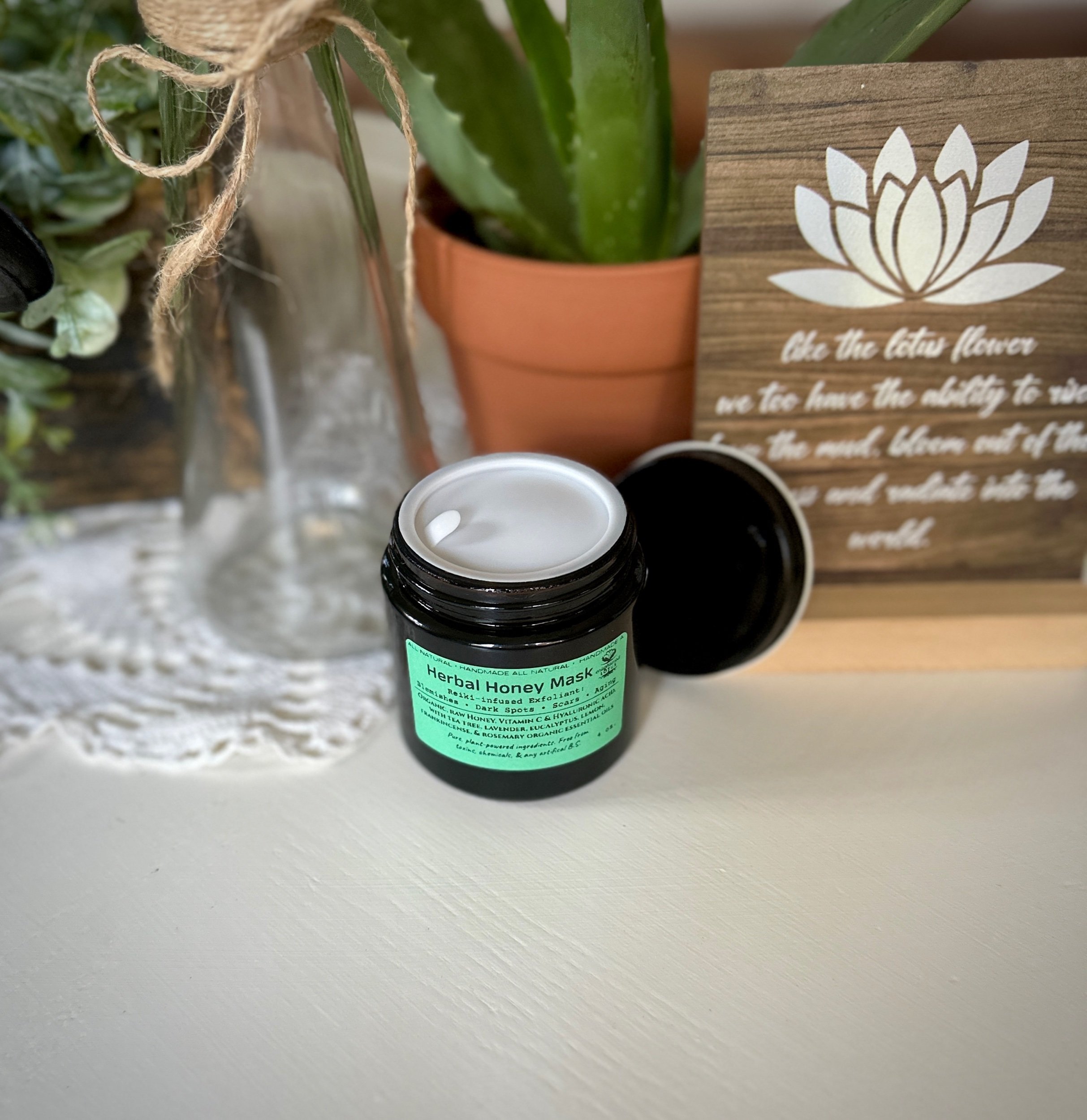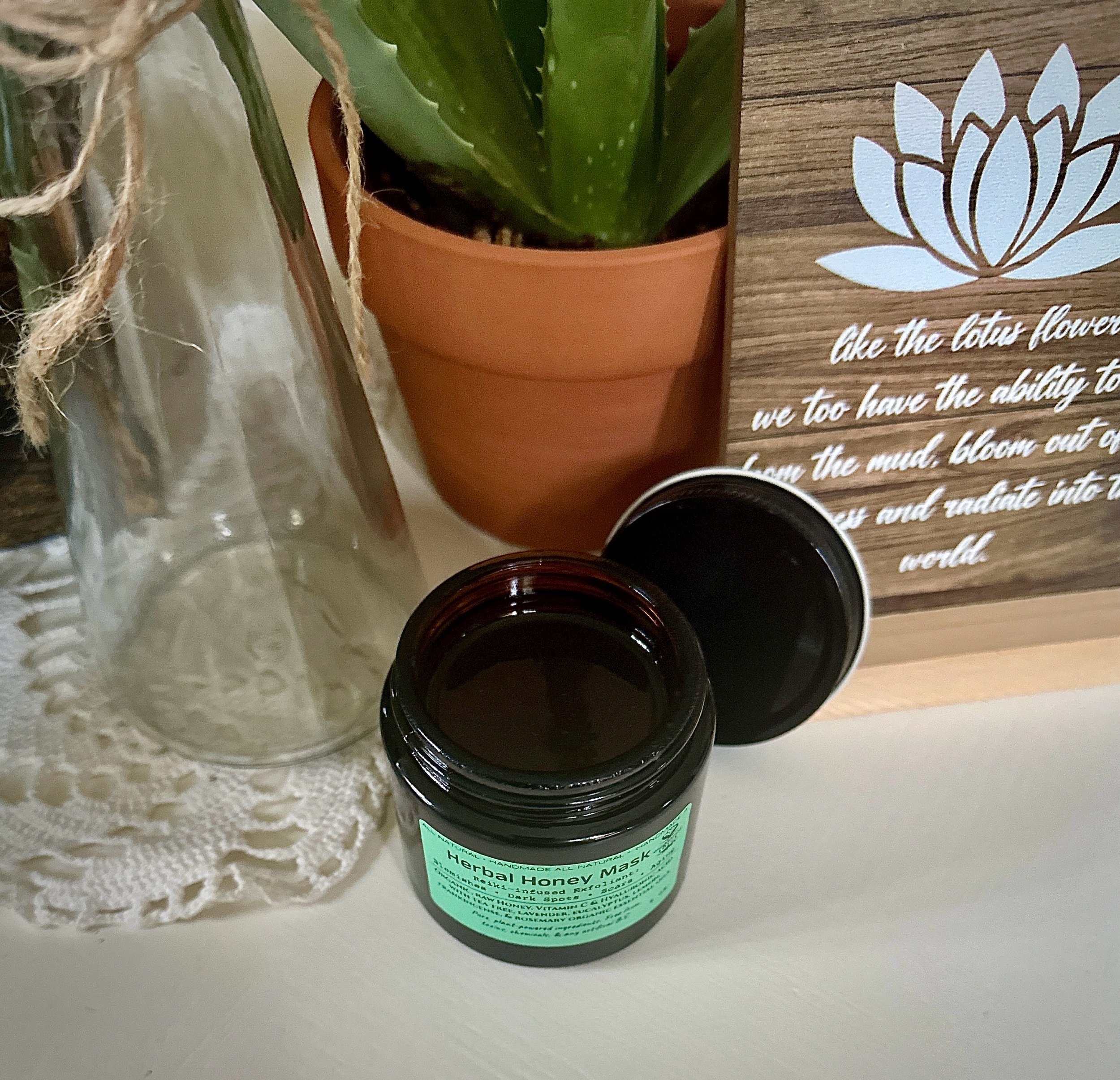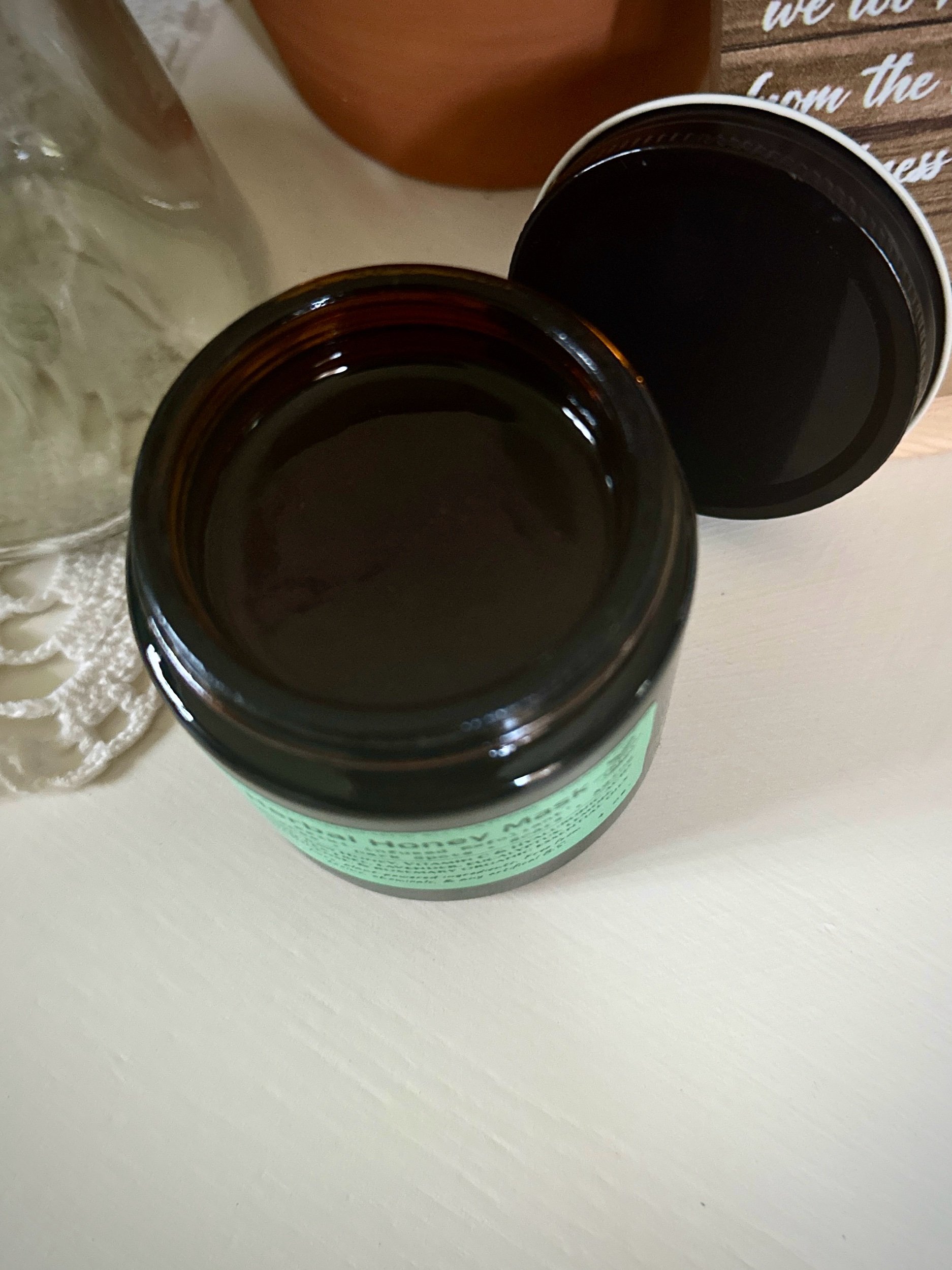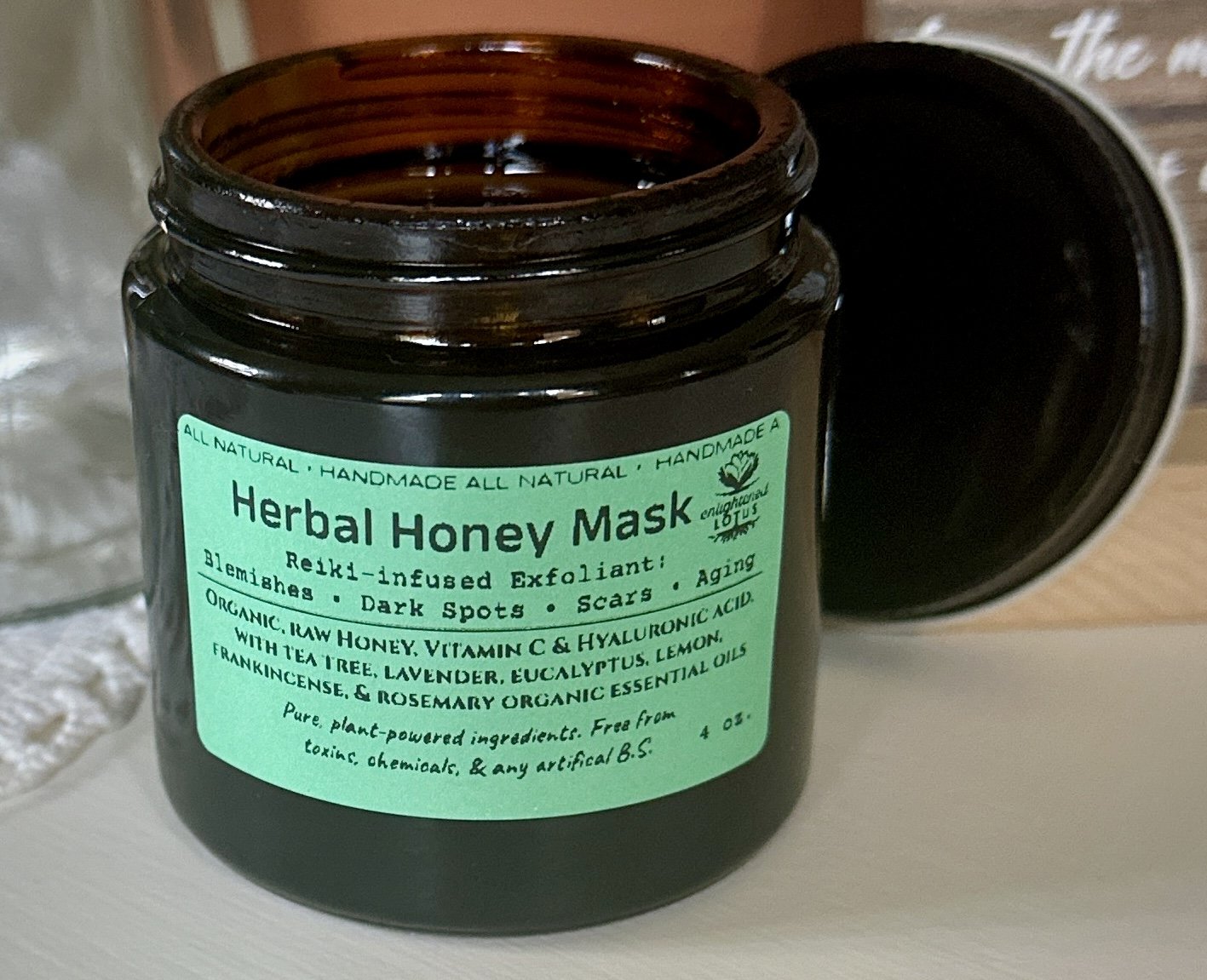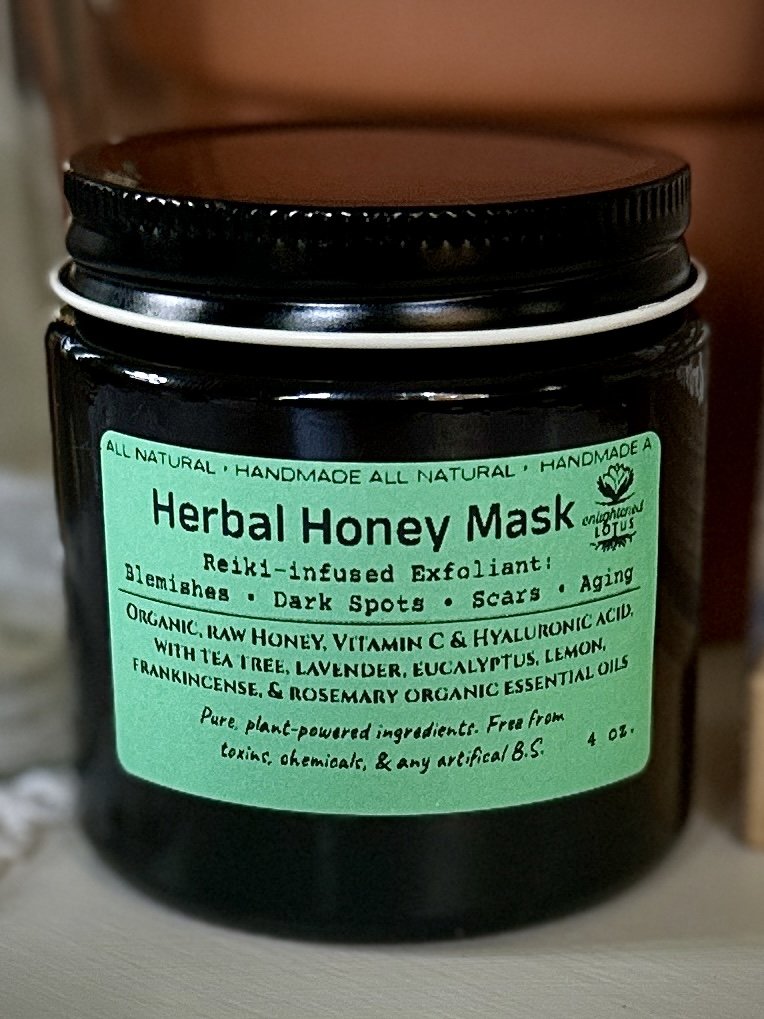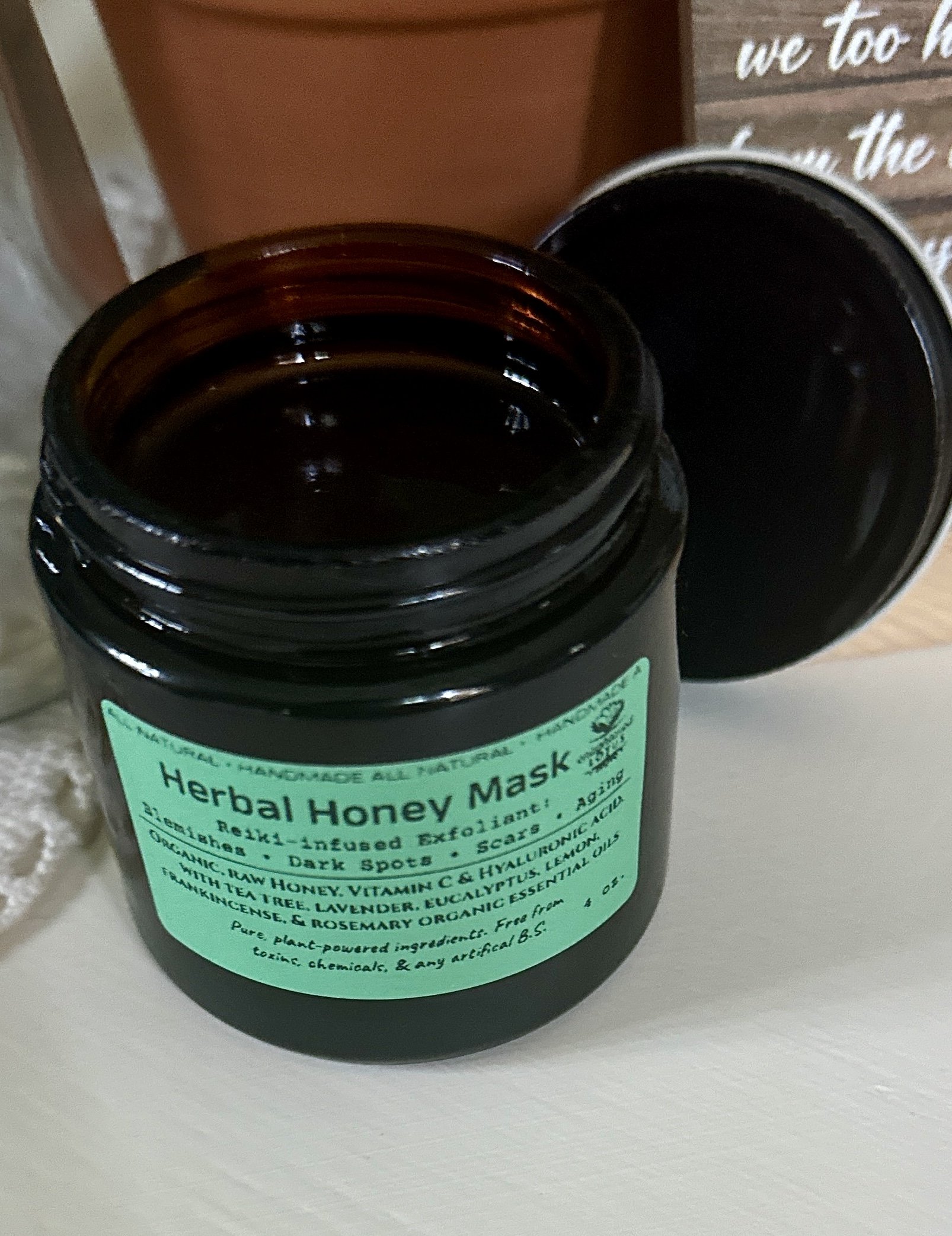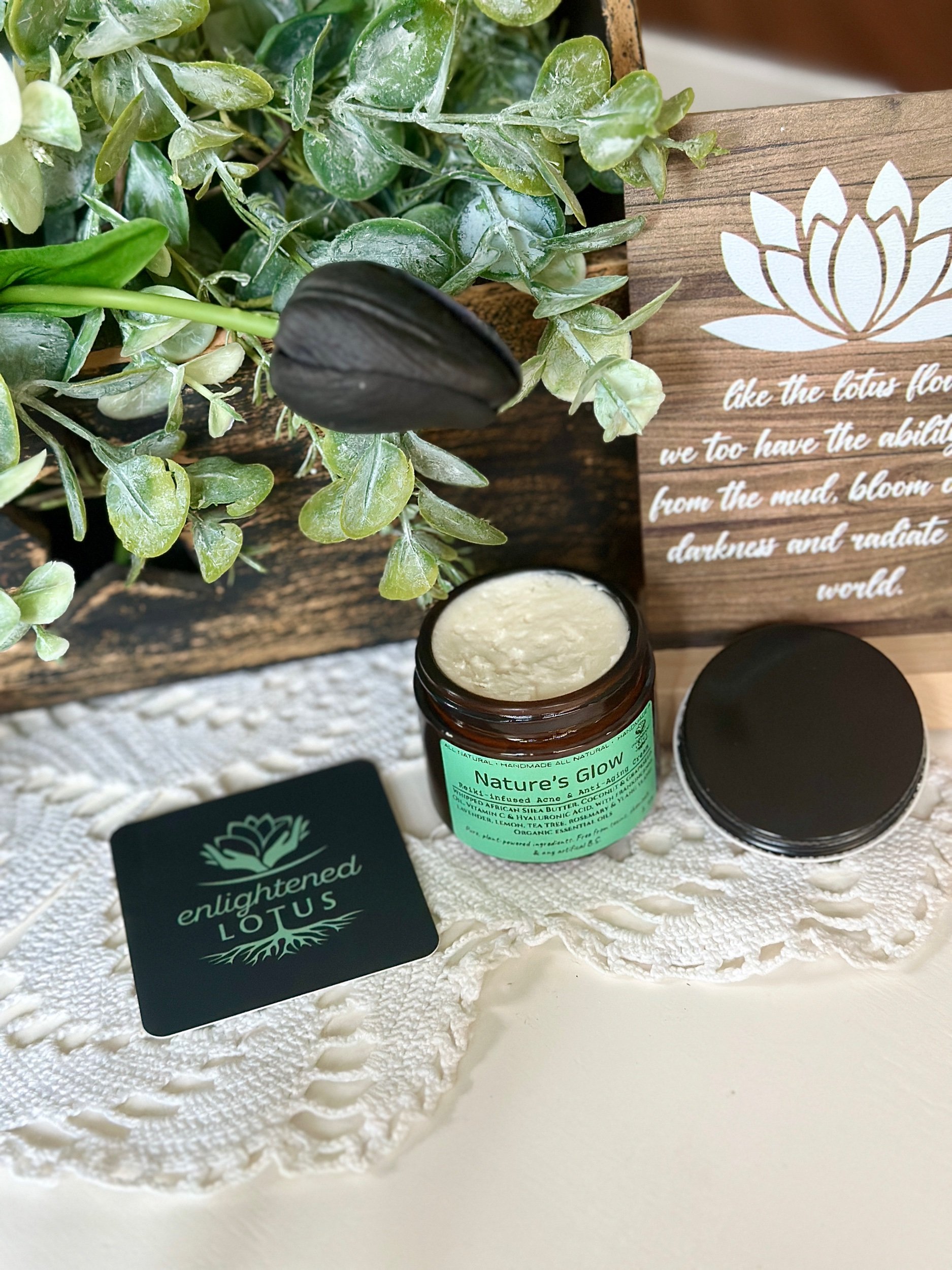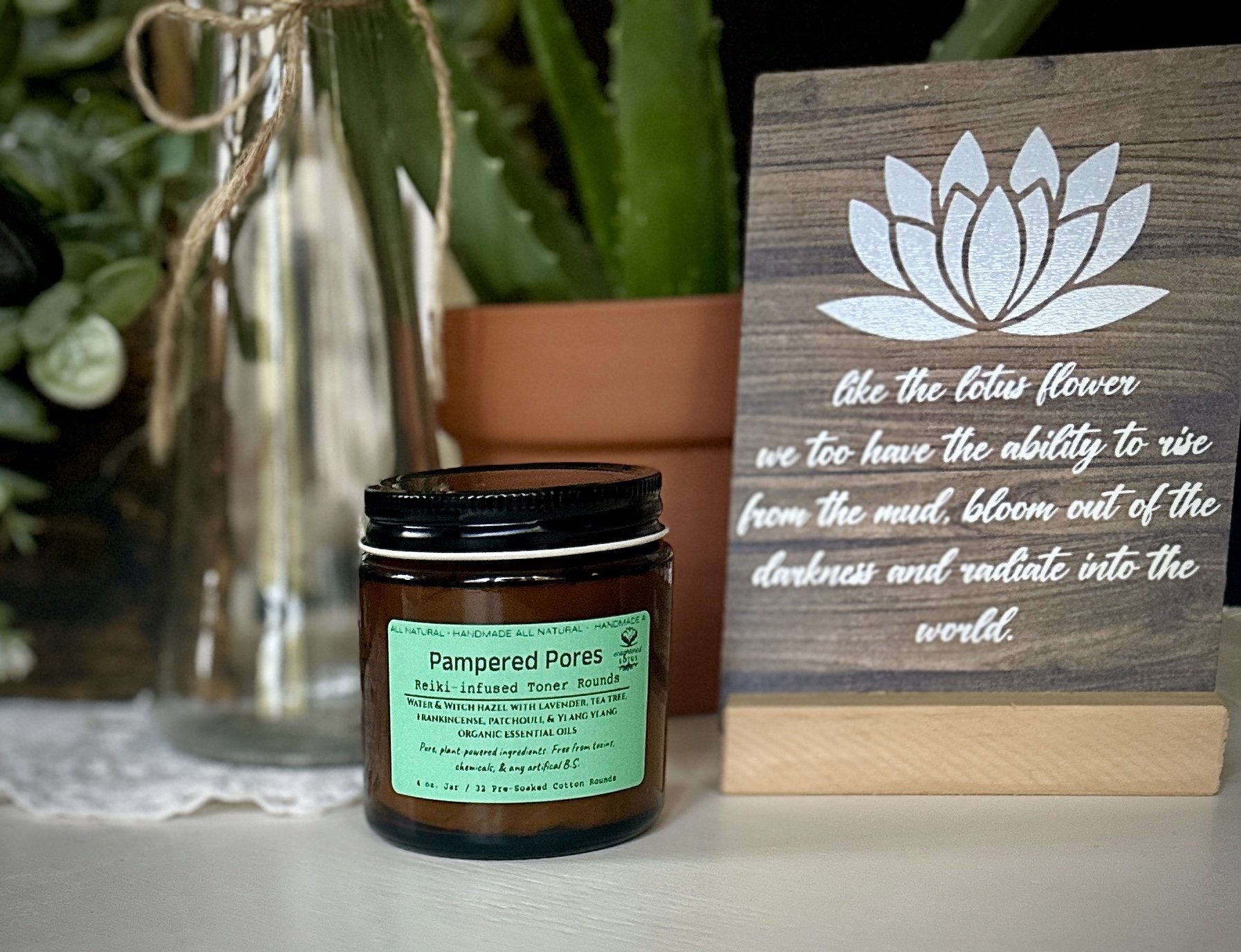Herbal Honey Mask: Reiki-infused Exfoliant
Embrace the golden ticket to natural beauty and let your skin bask in the sweet serenity of Herbal Honey.
Let your skin drink in nature’s sweetest offering with our Herbal Honey Mask, a deeply purifying, reiki-infused exfoliant to target blemishes, dark spots, scars, and signs of aging. This potent blend harnesses the natural healing properties of organic, raw honey and a mix of essential oils, combined with the scientifically-backed benefits of vitamin C and hyaluronic acid. The result? A radiant, youthful complexion that feels as soft and smooth as honey itself.
The Hidden Toxins in Skincare: A Wake-Up Call
Your skin absorbs more than you think, and just like with cleansers and toners, many exfoliants on the market are packed with harmful chemicals silently wreaking havoc on your body.
Parabens: A common preservative that disrupts hormones by mimicking estrogen, and are linked to breast cancer, reproductive issues, and premature aging due to their interference with collagen synthesis (Darbre & Harvey, 2008).
Artificial Fragrances: Often masking a cocktail of up to 4,000 chemicals, these “fragrances” can lead to irritation, hormone imbalance, and even cancer.
Sodium Lauryl Sulfate (SLS):A harsh detergent that strips your skin of its natural oils, leading to dryness, irritation, and an increase in acne (Pancio et al., 2019).
Phthalates: Common in beauty products to increase flexibility in plastics, phthalates are linked to hormonal disruptions, birth defects, and fertility problems. They have also been shown to accumulate in the body, increasing toxicity over time (Hauser et al., 2006).
PFAs (Per- and Polyfluoroalkyl Substances): Dubbed "forever chemicals," PFAs are used in skincare and cosmetics to increase product spreadability and water resistance. However, PFAs are linked to serious health concerns, including hormone disruption, immune system suppression, and an increased risk of cancer. Studies have also shown that these chemicals persist in the environment and can accumulate in human tissue over time (Whitehead et. al, 2021).
Choosing natural, toxin-free alternatives ensures your skin—and your body—are not burdened by these harmful ingredients.
Get that Golden Glow
Raw honey is more than just a sweet treat; it's a time-honored healing nectar with natural antibacterial and antioxidant properties. This ancient remedy helps reduce blemishes, heal scars and dark spots, and combat signs of aging, while shielding your skin from free radicals*. Honey’s rich antioxidants and natural enzymes draw out impurities and dead skin cells, cleanse without stripping natural oils, and soothe inflammation, making it a perfect choice for acne treatment. Its humectant properties lock in moisture, for a soft, dewy glow. Paired with Vitamin C’s brightening effects and hyaluronic acid’s hydrating boost, this exfoliant offers a scientifically-supported, holistic approach to skincare, with honey serving as your skin’s golden ticket to natural radiance (Mandal & Mandal, 2011).
*Free radicals can cause oxidative stress, which has been linked to inflammatory processes, chronic illnesses, aging, and the development of acne. (Bungau et. al., 2022).
Nature’s Potent Skin Healers
Vitamin C: Brightens complexion, fades dark spots, and evens skin tone by boosting collagen production. Vitamin C is essential for firm, youthful-looking skin (Pullar et al., 2017).
Hyaluronic Acid: Deeply hydrates, plumping the skin to reduce the appearance of fine lines and wrinkles, while creating a smooth, supple texture.
Manuka Oil: Offers remarkable benefits for acne, aging, and skin healing. Known for its strong antimicrobial action, manuka oil effectively targets acne-causing bacteria, thus reducing and preventing breakouts, while its renowned anti-inflammatory properties soothe irritated, acne-prone and sensitive skin. Additionally, manuka oil contains powerful antioxidants that protect against oxidative stress, helping to prevent premature skin aging and maintain elasticity, supporting a clear, youthful complexion (Mathew et al., 2020).
Tea Tree Essential Oil: Fights acne-causing bacteria, helping to clear blemishes and soothe inflammation (Enshaieh et al., 2007).
Lavender Essential Oil: Calms irritation and supports skin healing with its anti-inflammatory and regenerative properties, perfect for acne-prone or sensitive skin (Mori et al., 2016).
Frankincense Essential Oil: Regenerates skin cells, reduces wrinkles and scars, and boosts elasticity for a firmer, brighter complexion (Kotb et al., 2023).
Eucalyptus Essential Oil: Purifies pores and balances oil production helping to reduce puffiness and clear blemishes, leaving skin feeling clean and refreshed.
Lemon Essential Oil: Naturally brightens skin, helps lighten dark spots, and treats acne and rosacea with its antimicrobial and anti-inflammatory properties (Nurzyńska-Wierdak et. al., 2022).
Rosemary Essential Oil: Studies show rosemary oil has anti-inflammatory, antioxidant, antimicrobial, and anti-carcinogenic properties, which help boost circulation, combats free radicals, minimizes scarring, and promotes a healthy, even-toned complexion (Bangaru et al., 2022).
*We are dedicated to using high-quality, predominantly organic ingredients. Although some ingredients may not be available in organic form, we ensure our commitment to natural excellence remains unwavering.
Exfoliation Ritual
Get sticky with it! Apply about a teaspoon of this gooey goodness to your clean, dry face, avoiding eyes. Spread on a thick, sticky layer and let the honey work its magic for an hour, deeply cleansing, exfoliating, and nourishing your skin. Rinse with lukewarm water, finishing with a splash of cold to close your pores and lock in moisture.
Pro tip: Apply the honey mask about an hour before your shower for an easy rinse-off.
For sensitive skin, start with a once weekly use, gradually increasing to two or three times weekly for a beautifully balanced complexion.
For optimal results, follow with Clear Complexion Cleanser, Pampered Pores Toner Rounds, Acne Fighter Roll-On, and Nature’s Glow Acne & Anti-Aging Cream to complete your glowing skincare routine.
Eco-Friendly Packaging
Herbal Honey comes in a thick, amber glass jar with a sleek, black airtight lid to maintain its purity, protect it from UV damage, and prevent chemical leaching from plastics. Each 4 oz jar contains enough exfoliant for several months worth of skin-nourishing goodness.
Feel confident knowing we’re intentional about every detail because your health and happiness matters. 💕
Pregnancy Caution
Herbal Honey is crafted with safe, all-natural and organic ingredients. However, rosemary essential oil is generally not recommended during pregnancy, especially in larger amounts, as it can potentially cause uterine contractions. While our formula contains low concentrations, which may be considered safe for topical use in some individuals, we recommend erring on the side of caution and advise against using Herbal Honey while pregnant or nursing. (Tisserand & Young, 2014).
For our trying, expecting, or nursing mothers -- I've created a completely safe version for you! I'm in the process of uploading all the products, so please bare with me as I do not have the description released yet. However, orders can still be placed in the meantime, please don't hesitate to reach out.
Go Green!
Pamper yourself guilt-free with our eco-conscious, plant-based creations.
Herbal Honey is proudly free from toxins, chemicals, & any artificial B.S., while also being cruelty-free — because we believe true beauty comes from within, and our skin deserves nothing less than the purest, most nourishing ingredients nature has to offer. 🌿🐾
References
Bachir, R. G., & Benali, M. (2012). Antibacterial activity of the essential oils from the leaves of Eucalyptus globulus against Escherichia coli and Staphylococcus aureus. Asian Pacific Journal of Tropical Biomedicine, 2(9), 739-742. https://doi.org/10.1016/S2221-1691(12)60220-2
Bungau, A. F., Radu, A. F., Bungau, S. G., Vesa, C. M., Tit, D. M., Purza, A. L., & Endres, L. M. (2023). Emerging Insights into the Applicability of Essential Oils in the Management of Acne Vulgaris. Molecules (Basel, Switzerland), 28(17), 6395. https://doi.org/10.3390/molecules28176395
Darbre, P. D., & Harvey, P. W. (2008). Paraben esters: Review of recent studies of endocrine toxicity, absorption, esterase and human exposure, and discussion of potential human health risks. Journal of Applied Toxicology, 28(5), 561-578. https://doi.org/10.1002/jat.1358
Enshaieh, S., Jooya, A., Siadat, A. H., & Iraji, F. (2007). The efficacy of 5% topical tea tree oil gel in mild to moderate acne vulgaris: a randomized, double-blind placebo-controlled study. Indian Journal of Dermatology, Venereology, and Leprology, 73(1), 22-25. https://doi.org/10.4103/0378-6323.30646
Hauser, R., Meeker, J. D., Singh, N. P., Silva, M. J., Ryan, L., Duty, S., & Calafat, A. M. (2006). DNA damage in human sperm is related to urinary levels of phthalate monoester and oxidative metabolites. Human Reproduction, 22(3), 688–695. https://doi.org/10.1093/humrep/del428
Kotb, E. A., El-Shiekh, R. A., Abd-Elsalam, W. H., El Sayed, N. S. E. D., El Tanbouly, N., & El Senousy, A. S. (2023). Protective potential of frankincense essential oil and its loaded solid lipid nanoparticles against UVB-induced photodamage in rats via MAPK and PI3K/AKT signaling pathways; A promising anti-aging therapy. PloS One, 18(12), e0294067. https://doi.org/10.1371/journal.pone.0294067
Mandal, M. D., & Mandal, S. (2011). Honey: its medicinal property and antibacterial activity. Asian Pacific Journal of Tropical Biomedicine, 1(2), 154-160. https://doi.org/10.1016/S2221-1691(11)60016-6
Mathew, C., Tesfaye, W., Rasmussen, P., Peterson, G. M., Bartholomaeus, A., Sharma, M., & Thomas, J. (2020). Mānuka oil—a review of antimicrobial and other medicinal properties. Pharmaceuticals, 13(11), 343. https://doi.org/10.3390/ph13110343
Nurzyńska-Wierdak, R., Pietrasik, D., & Walasek-Janusz, M. (2022). Essential Oils in the Treatment of Various Types of Acne-A Review. Plants (Basel, Switzerland), 12(1), 90. https://doi.org/10.3390/plants12010090
Mori, H. M., Kawanami, H., Kawahata, H. et al. (2016). Wound healing potential of lavender oil by acceleration of granulation and wound contraction through induction of TGF-β in a rat model. BMC Complementary and Alternative Medicine, 16, 144. https://doi.org/10.1186/s12906-016-1128-7
Panico, A., Serio, F., Bagordo, F., Grassi, T., Idolo, A., DE Giorgi, M., Guido, M., Congedo, M., & DE Donno, A. (2019). Skin safety and health prevention: an overview of chemicals in cosmetic products. Journal of preventive medicine and hygiene, 60(1), E50–E57. https://doi.org/10.15167/2421-4248/jpmh2019.60.1.1080
Pullar, J. M., Carr, A. C., & Vissers, M. C. (2017). The roles of vitamin C in skin health. Nutrients, 9(8), 866. https://doi.org/10.3390/nu9080866
Tisserand, R., & Young, R. (2014). Essential Oil Safety: A Guide for Health Care Professionals. Elsevier.
Whitehead, H. D., Venier, M., Wu, Y., Eastman, E., Urbanik, S., Diamond, M. L., Shalin, A., Schwartz-Narbonne, H., Bruton, T. A., Blum, A., Wang, Z., Green, M., Tighe, M., Wilkinson, J. T., McGuinness, S., & Peaslee, G. F. (2021). Fluorinated compounds in North American cosmetics. Environmental Science & Technology Letters, 8(7), 538–544. https://doi.org/10.1021/acs.estlett.1c00240
Embrace the golden ticket to natural beauty and let your skin bask in the sweet serenity of Herbal Honey.
Embrace the golden ticket to natural beauty and let your skin bask in the sweet serenity of Herbal Honey.
Let your skin drink in nature’s sweetest offering with our Herbal Honey Mask, a deeply purifying, reiki-infused exfoliant to target blemishes, dark spots, scars, and signs of aging. This potent blend harnesses the natural healing properties of organic, raw honey and a mix of essential oils, combined with the scientifically-backed benefits of vitamin C and hyaluronic acid. The result? A radiant, youthful complexion that feels as soft and smooth as honey itself.
The Hidden Toxins in Skincare: A Wake-Up Call
Your skin absorbs more than you think, and just like with cleansers and toners, many exfoliants on the market are packed with harmful chemicals silently wreaking havoc on your body.
Parabens: A common preservative that disrupts hormones by mimicking estrogen, and are linked to breast cancer, reproductive issues, and premature aging due to their interference with collagen synthesis (Darbre & Harvey, 2008).
Artificial Fragrances: Often masking a cocktail of up to 4,000 chemicals, these “fragrances” can lead to irritation, hormone imbalance, and even cancer.
Sodium Lauryl Sulfate (SLS):A harsh detergent that strips your skin of its natural oils, leading to dryness, irritation, and an increase in acne (Pancio et al., 2019).
Phthalates: Common in beauty products to increase flexibility in plastics, phthalates are linked to hormonal disruptions, birth defects, and fertility problems. They have also been shown to accumulate in the body, increasing toxicity over time (Hauser et al., 2006).
PFAs (Per- and Polyfluoroalkyl Substances): Dubbed "forever chemicals," PFAs are used in skincare and cosmetics to increase product spreadability and water resistance. However, PFAs are linked to serious health concerns, including hormone disruption, immune system suppression, and an increased risk of cancer. Studies have also shown that these chemicals persist in the environment and can accumulate in human tissue over time (Whitehead et. al, 2021).
Choosing natural, toxin-free alternatives ensures your skin—and your body—are not burdened by these harmful ingredients.
Get that Golden Glow
Raw honey is more than just a sweet treat; it's a time-honored healing nectar with natural antibacterial and antioxidant properties. This ancient remedy helps reduce blemishes, heal scars and dark spots, and combat signs of aging, while shielding your skin from free radicals*. Honey’s rich antioxidants and natural enzymes draw out impurities and dead skin cells, cleanse without stripping natural oils, and soothe inflammation, making it a perfect choice for acne treatment. Its humectant properties lock in moisture, for a soft, dewy glow. Paired with Vitamin C’s brightening effects and hyaluronic acid’s hydrating boost, this exfoliant offers a scientifically-supported, holistic approach to skincare, with honey serving as your skin’s golden ticket to natural radiance (Mandal & Mandal, 2011).
*Free radicals can cause oxidative stress, which has been linked to inflammatory processes, chronic illnesses, aging, and the development of acne. (Bungau et. al., 2022).
Nature’s Potent Skin Healers
Vitamin C: Brightens complexion, fades dark spots, and evens skin tone by boosting collagen production. Vitamin C is essential for firm, youthful-looking skin (Pullar et al., 2017).
Hyaluronic Acid: Deeply hydrates, plumping the skin to reduce the appearance of fine lines and wrinkles, while creating a smooth, supple texture.
Manuka Oil: Offers remarkable benefits for acne, aging, and skin healing. Known for its strong antimicrobial action, manuka oil effectively targets acne-causing bacteria, thus reducing and preventing breakouts, while its renowned anti-inflammatory properties soothe irritated, acne-prone and sensitive skin. Additionally, manuka oil contains powerful antioxidants that protect against oxidative stress, helping to prevent premature skin aging and maintain elasticity, supporting a clear, youthful complexion (Mathew et al., 2020).
Tea Tree Essential Oil: Fights acne-causing bacteria, helping to clear blemishes and soothe inflammation (Enshaieh et al., 2007).
Lavender Essential Oil: Calms irritation and supports skin healing with its anti-inflammatory and regenerative properties, perfect for acne-prone or sensitive skin (Mori et al., 2016).
Frankincense Essential Oil: Regenerates skin cells, reduces wrinkles and scars, and boosts elasticity for a firmer, brighter complexion (Kotb et al., 2023).
Eucalyptus Essential Oil: Purifies pores and balances oil production helping to reduce puffiness and clear blemishes, leaving skin feeling clean and refreshed.
Lemon Essential Oil: Naturally brightens skin, helps lighten dark spots, and treats acne and rosacea with its antimicrobial and anti-inflammatory properties (Nurzyńska-Wierdak et. al., 2022).
Rosemary Essential Oil: Studies show rosemary oil has anti-inflammatory, antioxidant, antimicrobial, and anti-carcinogenic properties, which help boost circulation, combats free radicals, minimizes scarring, and promotes a healthy, even-toned complexion (Bangaru et al., 2022).
*We are dedicated to using high-quality, predominantly organic ingredients. Although some ingredients may not be available in organic form, we ensure our commitment to natural excellence remains unwavering.
Exfoliation Ritual
Get sticky with it! Apply about a teaspoon of this gooey goodness to your clean, dry face, avoiding eyes. Spread on a thick, sticky layer and let the honey work its magic for an hour, deeply cleansing, exfoliating, and nourishing your skin. Rinse with lukewarm water, finishing with a splash of cold to close your pores and lock in moisture.
Pro tip: Apply the honey mask about an hour before your shower for an easy rinse-off.
For sensitive skin, start with a once weekly use, gradually increasing to two or three times weekly for a beautifully balanced complexion.
For optimal results, follow with Clear Complexion Cleanser, Pampered Pores Toner Rounds, Acne Fighter Roll-On, and Nature’s Glow Acne & Anti-Aging Cream to complete your glowing skincare routine.
Eco-Friendly Packaging
Herbal Honey comes in a thick, amber glass jar with a sleek, black airtight lid to maintain its purity, protect it from UV damage, and prevent chemical leaching from plastics. Each 4 oz jar contains enough exfoliant for several months worth of skin-nourishing goodness.
Feel confident knowing we’re intentional about every detail because your health and happiness matters. 💕
Pregnancy Caution
Herbal Honey is crafted with safe, all-natural and organic ingredients. However, rosemary essential oil is generally not recommended during pregnancy, especially in larger amounts, as it can potentially cause uterine contractions. While our formula contains low concentrations, which may be considered safe for topical use in some individuals, we recommend erring on the side of caution and advise against using Herbal Honey while pregnant or nursing. (Tisserand & Young, 2014).
For our trying, expecting, or nursing mothers -- I've created a completely safe version for you! I'm in the process of uploading all the products, so please bare with me as I do not have the description released yet. However, orders can still be placed in the meantime, please don't hesitate to reach out.
Go Green!
Pamper yourself guilt-free with our eco-conscious, plant-based creations.
Herbal Honey is proudly free from toxins, chemicals, & any artificial B.S., while also being cruelty-free — because we believe true beauty comes from within, and our skin deserves nothing less than the purest, most nourishing ingredients nature has to offer. 🌿🐾
References
Bachir, R. G., & Benali, M. (2012). Antibacterial activity of the essential oils from the leaves of Eucalyptus globulus against Escherichia coli and Staphylococcus aureus. Asian Pacific Journal of Tropical Biomedicine, 2(9), 739-742. https://doi.org/10.1016/S2221-1691(12)60220-2
Bungau, A. F., Radu, A. F., Bungau, S. G., Vesa, C. M., Tit, D. M., Purza, A. L., & Endres, L. M. (2023). Emerging Insights into the Applicability of Essential Oils in the Management of Acne Vulgaris. Molecules (Basel, Switzerland), 28(17), 6395. https://doi.org/10.3390/molecules28176395
Darbre, P. D., & Harvey, P. W. (2008). Paraben esters: Review of recent studies of endocrine toxicity, absorption, esterase and human exposure, and discussion of potential human health risks. Journal of Applied Toxicology, 28(5), 561-578. https://doi.org/10.1002/jat.1358
Enshaieh, S., Jooya, A., Siadat, A. H., & Iraji, F. (2007). The efficacy of 5% topical tea tree oil gel in mild to moderate acne vulgaris: a randomized, double-blind placebo-controlled study. Indian Journal of Dermatology, Venereology, and Leprology, 73(1), 22-25. https://doi.org/10.4103/0378-6323.30646
Hauser, R., Meeker, J. D., Singh, N. P., Silva, M. J., Ryan, L., Duty, S., & Calafat, A. M. (2006). DNA damage in human sperm is related to urinary levels of phthalate monoester and oxidative metabolites. Human Reproduction, 22(3), 688–695. https://doi.org/10.1093/humrep/del428
Kotb, E. A., El-Shiekh, R. A., Abd-Elsalam, W. H., El Sayed, N. S. E. D., El Tanbouly, N., & El Senousy, A. S. (2023). Protective potential of frankincense essential oil and its loaded solid lipid nanoparticles against UVB-induced photodamage in rats via MAPK and PI3K/AKT signaling pathways; A promising anti-aging therapy. PloS One, 18(12), e0294067. https://doi.org/10.1371/journal.pone.0294067
Mandal, M. D., & Mandal, S. (2011). Honey: its medicinal property and antibacterial activity. Asian Pacific Journal of Tropical Biomedicine, 1(2), 154-160. https://doi.org/10.1016/S2221-1691(11)60016-6
Mathew, C., Tesfaye, W., Rasmussen, P., Peterson, G. M., Bartholomaeus, A., Sharma, M., & Thomas, J. (2020). Mānuka oil—a review of antimicrobial and other medicinal properties. Pharmaceuticals, 13(11), 343. https://doi.org/10.3390/ph13110343
Nurzyńska-Wierdak, R., Pietrasik, D., & Walasek-Janusz, M. (2022). Essential Oils in the Treatment of Various Types of Acne-A Review. Plants (Basel, Switzerland), 12(1), 90. https://doi.org/10.3390/plants12010090
Mori, H. M., Kawanami, H., Kawahata, H. et al. (2016). Wound healing potential of lavender oil by acceleration of granulation and wound contraction through induction of TGF-β in a rat model. BMC Complementary and Alternative Medicine, 16, 144. https://doi.org/10.1186/s12906-016-1128-7
Panico, A., Serio, F., Bagordo, F., Grassi, T., Idolo, A., DE Giorgi, M., Guido, M., Congedo, M., & DE Donno, A. (2019). Skin safety and health prevention: an overview of chemicals in cosmetic products. Journal of preventive medicine and hygiene, 60(1), E50–E57. https://doi.org/10.15167/2421-4248/jpmh2019.60.1.1080
Pullar, J. M., Carr, A. C., & Vissers, M. C. (2017). The roles of vitamin C in skin health. Nutrients, 9(8), 866. https://doi.org/10.3390/nu9080866
Tisserand, R., & Young, R. (2014). Essential Oil Safety: A Guide for Health Care Professionals. Elsevier.
Whitehead, H. D., Venier, M., Wu, Y., Eastman, E., Urbanik, S., Diamond, M. L., Shalin, A., Schwartz-Narbonne, H., Bruton, T. A., Blum, A., Wang, Z., Green, M., Tighe, M., Wilkinson, J. T., McGuinness, S., & Peaslee, G. F. (2021). Fluorinated compounds in North American cosmetics. Environmental Science & Technology Letters, 8(7), 538–544. https://doi.org/10.1021/acs.estlett.1c00240
Embrace the golden ticket to natural beauty and let your skin bask in the sweet serenity of Herbal Honey.

Embrace the golden ticket to natural beauty and let your skin bask in the sweet serenity of Herbal Honey.
Let your skin drink in nature’s sweetest offering with our Herbal Honey Mask, a deeply purifying, reiki-infused exfoliant to target blemishes, dark spots, scars, and signs of aging. This potent blend harnesses the natural healing properties of organic, raw honey and a mix of essential oils, combined with the scientifically-backed benefits of vitamin C and hyaluronic acid. The result? A radiant, youthful complexion that feels as soft and smooth as honey itself.
The Hidden Toxins in Skincare: A Wake-Up Call
Your skin absorbs more than you think, and just like with cleansers and toners, many exfoliants on the market are packed with harmful chemicals silently wreaking havoc on your body.
Parabens: A common preservative that disrupts hormones by mimicking estrogen, and are linked to breast cancer, reproductive issues, and premature aging due to their interference with collagen synthesis (Darbre & Harvey, 2008).
Artificial Fragrances: Often masking a cocktail of up to 4,000 chemicals, these “fragrances” can lead to irritation, hormone imbalance, and even cancer.
Sodium Lauryl Sulfate (SLS):A harsh detergent that strips your skin of its natural oils, leading to dryness, irritation, and an increase in acne (Pancio et al., 2019).
Phthalates: Common in beauty products to increase flexibility in plastics, phthalates are linked to hormonal disruptions, birth defects, and fertility problems. They have also been shown to accumulate in the body, increasing toxicity over time (Hauser et al., 2006).
PFAs (Per- and Polyfluoroalkyl Substances): Dubbed "forever chemicals," PFAs are used in skincare and cosmetics to increase product spreadability and water resistance. However, PFAs are linked to serious health concerns, including hormone disruption, immune system suppression, and an increased risk of cancer. Studies have also shown that these chemicals persist in the environment and can accumulate in human tissue over time (Whitehead et. al, 2021).
Choosing natural, toxin-free alternatives ensures your skin—and your body—are not burdened by these harmful ingredients.
Get that Golden Glow
Raw honey is more than just a sweet treat; it's a time-honored healing nectar with natural antibacterial and antioxidant properties. This ancient remedy helps reduce blemishes, heal scars and dark spots, and combat signs of aging, while shielding your skin from free radicals*. Honey’s rich antioxidants and natural enzymes draw out impurities and dead skin cells, cleanse without stripping natural oils, and soothe inflammation, making it a perfect choice for acne treatment. Its humectant properties lock in moisture, for a soft, dewy glow. Paired with Vitamin C’s brightening effects and hyaluronic acid’s hydrating boost, this exfoliant offers a scientifically-supported, holistic approach to skincare, with honey serving as your skin’s golden ticket to natural radiance (Mandal & Mandal, 2011).
*Free radicals can cause oxidative stress, which has been linked to inflammatory processes, chronic illnesses, aging, and the development of acne. (Bungau et. al., 2022).
Nature’s Potent Skin Healers
Vitamin C: Brightens complexion, fades dark spots, and evens skin tone by boosting collagen production. Vitamin C is essential for firm, youthful-looking skin (Pullar et al., 2017).
Hyaluronic Acid: Deeply hydrates, plumping the skin to reduce the appearance of fine lines and wrinkles, while creating a smooth, supple texture.
Manuka Oil: Offers remarkable benefits for acne, aging, and skin healing. Known for its strong antimicrobial action, manuka oil effectively targets acne-causing bacteria, thus reducing and preventing breakouts, while its renowned anti-inflammatory properties soothe irritated, acne-prone and sensitive skin. Additionally, manuka oil contains powerful antioxidants that protect against oxidative stress, helping to prevent premature skin aging and maintain elasticity, supporting a clear, youthful complexion (Mathew et al., 2020).
Tea Tree Essential Oil: Fights acne-causing bacteria, helping to clear blemishes and soothe inflammation (Enshaieh et al., 2007).
Lavender Essential Oil: Calms irritation and supports skin healing with its anti-inflammatory and regenerative properties, perfect for acne-prone or sensitive skin (Mori et al., 2016).
Frankincense Essential Oil: Regenerates skin cells, reduces wrinkles and scars, and boosts elasticity for a firmer, brighter complexion (Kotb et al., 2023).
Eucalyptus Essential Oil: Purifies pores and balances oil production helping to reduce puffiness and clear blemishes, leaving skin feeling clean and refreshed.
Lemon Essential Oil: Naturally brightens skin, helps lighten dark spots, and treats acne and rosacea with its antimicrobial and anti-inflammatory properties (Nurzyńska-Wierdak et. al., 2022).
Rosemary Essential Oil: Studies show rosemary oil has anti-inflammatory, antioxidant, antimicrobial, and anti-carcinogenic properties, which help boost circulation, combats free radicals, minimizes scarring, and promotes a healthy, even-toned complexion (Bangaru et al., 2022).
*We are dedicated to using high-quality, predominantly organic ingredients. Although some ingredients may not be available in organic form, we ensure our commitment to natural excellence remains unwavering.
Exfoliation Ritual
Get sticky with it! Apply about a teaspoon of this gooey goodness to your clean, dry face, avoiding eyes. Spread on a thick, sticky layer and let the honey work its magic for an hour, deeply cleansing, exfoliating, and nourishing your skin. Rinse with lukewarm water, finishing with a splash of cold to close your pores and lock in moisture.
Pro tip: Apply the honey mask about an hour before your shower for an easy rinse-off.
For sensitive skin, start with a once weekly use, gradually increasing to two or three times weekly for a beautifully balanced complexion.
For optimal results, follow with Clear Complexion Cleanser, Pampered Pores Toner Rounds, Acne Fighter Roll-On, and Nature’s Glow Acne & Anti-Aging Cream to complete your glowing skincare routine.
Eco-Friendly Packaging
Herbal Honey comes in a thick, amber glass jar with a sleek, black airtight lid to maintain its purity, protect it from UV damage, and prevent chemical leaching from plastics. Each 4 oz jar contains enough exfoliant for several months worth of skin-nourishing goodness.
Feel confident knowing we’re intentional about every detail because your health and happiness matters. 💕
Pregnancy Caution
Herbal Honey is crafted with safe, all-natural and organic ingredients. However, rosemary essential oil is generally not recommended during pregnancy, especially in larger amounts, as it can potentially cause uterine contractions. While our formula contains low concentrations, which may be considered safe for topical use in some individuals, we recommend erring on the side of caution and advise against using Herbal Honey while pregnant or nursing. (Tisserand & Young, 2014).
For our trying, expecting, or nursing mothers -- I've created a completely safe version for you! I'm in the process of uploading all the products, so please bare with me as I do not have the description released yet. However, orders can still be placed in the meantime, please don't hesitate to reach out.
Go Green!
Pamper yourself guilt-free with our eco-conscious, plant-based creations.
Herbal Honey is proudly free from toxins, chemicals, & any artificial B.S., while also being cruelty-free — because we believe true beauty comes from within, and our skin deserves nothing less than the purest, most nourishing ingredients nature has to offer. 🌿🐾
References
Bachir, R. G., & Benali, M. (2012). Antibacterial activity of the essential oils from the leaves of Eucalyptus globulus against Escherichia coli and Staphylococcus aureus. Asian Pacific Journal of Tropical Biomedicine, 2(9), 739-742. https://doi.org/10.1016/S2221-1691(12)60220-2
Bungau, A. F., Radu, A. F., Bungau, S. G., Vesa, C. M., Tit, D. M., Purza, A. L., & Endres, L. M. (2023). Emerging Insights into the Applicability of Essential Oils in the Management of Acne Vulgaris. Molecules (Basel, Switzerland), 28(17), 6395. https://doi.org/10.3390/molecules28176395
Darbre, P. D., & Harvey, P. W. (2008). Paraben esters: Review of recent studies of endocrine toxicity, absorption, esterase and human exposure, and discussion of potential human health risks. Journal of Applied Toxicology, 28(5), 561-578. https://doi.org/10.1002/jat.1358
Enshaieh, S., Jooya, A., Siadat, A. H., & Iraji, F. (2007). The efficacy of 5% topical tea tree oil gel in mild to moderate acne vulgaris: a randomized, double-blind placebo-controlled study. Indian Journal of Dermatology, Venereology, and Leprology, 73(1), 22-25. https://doi.org/10.4103/0378-6323.30646
Hauser, R., Meeker, J. D., Singh, N. P., Silva, M. J., Ryan, L., Duty, S., & Calafat, A. M. (2006). DNA damage in human sperm is related to urinary levels of phthalate monoester and oxidative metabolites. Human Reproduction, 22(3), 688–695. https://doi.org/10.1093/humrep/del428
Kotb, E. A., El-Shiekh, R. A., Abd-Elsalam, W. H., El Sayed, N. S. E. D., El Tanbouly, N., & El Senousy, A. S. (2023). Protective potential of frankincense essential oil and its loaded solid lipid nanoparticles against UVB-induced photodamage in rats via MAPK and PI3K/AKT signaling pathways; A promising anti-aging therapy. PloS One, 18(12), e0294067. https://doi.org/10.1371/journal.pone.0294067
Mandal, M. D., & Mandal, S. (2011). Honey: its medicinal property and antibacterial activity. Asian Pacific Journal of Tropical Biomedicine, 1(2), 154-160. https://doi.org/10.1016/S2221-1691(11)60016-6
Mathew, C., Tesfaye, W., Rasmussen, P., Peterson, G. M., Bartholomaeus, A., Sharma, M., & Thomas, J. (2020). Mānuka oil—a review of antimicrobial and other medicinal properties. Pharmaceuticals, 13(11), 343. https://doi.org/10.3390/ph13110343
Nurzyńska-Wierdak, R., Pietrasik, D., & Walasek-Janusz, M. (2022). Essential Oils in the Treatment of Various Types of Acne-A Review. Plants (Basel, Switzerland), 12(1), 90. https://doi.org/10.3390/plants12010090
Mori, H. M., Kawanami, H., Kawahata, H. et al. (2016). Wound healing potential of lavender oil by acceleration of granulation and wound contraction through induction of TGF-β in a rat model. BMC Complementary and Alternative Medicine, 16, 144. https://doi.org/10.1186/s12906-016-1128-7
Panico, A., Serio, F., Bagordo, F., Grassi, T., Idolo, A., DE Giorgi, M., Guido, M., Congedo, M., & DE Donno, A. (2019). Skin safety and health prevention: an overview of chemicals in cosmetic products. Journal of preventive medicine and hygiene, 60(1), E50–E57. https://doi.org/10.15167/2421-4248/jpmh2019.60.1.1080
Pullar, J. M., Carr, A. C., & Vissers, M. C. (2017). The roles of vitamin C in skin health. Nutrients, 9(8), 866. https://doi.org/10.3390/nu9080866
Tisserand, R., & Young, R. (2014). Essential Oil Safety: A Guide for Health Care Professionals. Elsevier.
Whitehead, H. D., Venier, M., Wu, Y., Eastman, E., Urbanik, S., Diamond, M. L., Shalin, A., Schwartz-Narbonne, H., Bruton, T. A., Blum, A., Wang, Z., Green, M., Tighe, M., Wilkinson, J. T., McGuinness, S., & Peaslee, G. F. (2021). Fluorinated compounds in North American cosmetics. Environmental Science & Technology Letters, 8(7), 538–544. https://doi.org/10.1021/acs.estlett.1c00240

